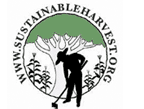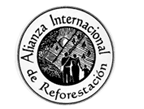Our
planting Partners
We are proud
to present our planting partners, which assist us in our mission
to balance out books by planting trees. Our three planting partners
are all non-profit organizations working in developing countries
for the benefit of both the environment and local communities
in these countries. They are working in regions where deforestation
is a crucial problem and where the trees planted provide many
local people with opportunities for a better future. All of
our partners are committed to sustainable practices as well
to working closely with local communities to ensure the success
of planting operations.
We chose our planting partners carefully to ensure maximum transparency
and accountability in our mutual work. Our planting partners
are incorporated either in the USA (SHI and AIR), or in the
UK (RIPPLE Africa), are subject to strict non-profit reporting
standards and their financial statements are regularly audited
by CPA firms.
We maintain close relationships with our planting partners and
will evaluate the planting projects conducted by them on annual
basis. These assessments will be reviewed by Eco-Libris' natural
resources experts and will be published on our website.
Please have a look at our 3 planting partners:
 |
Sustainable
Harvest International (SHI)
Region: Central America
(Belize, Honduras, Nicaragua and Panama)
|
Central America
has lost more than half of its rainforests in the last
50 years, contributing to mass extinctions and global
warming. Rainforest destruction also wreaks havoc on local
populations who depend on the rainforest for their survival.
Founded in 1997 by Returned Peace Corps Volunteer Florence
Reed, Sustainable Harvest International addresses the
tropical deforestation crisis in Central America by providing
farmers with sustainable alternatives to slash-and-burn
agriculture. SHI facilitates long-term collaboration among
trained local agricultural staff, farmers and communities
to implement sustainable land-use practices that alleviate
poverty by restoring ecological stability. With SHI’s
integrated approach to sustainable rural development,
poor farmers adopt environmentally, culturally and economically
sustainable land-use techniques that stop rainforest destruction
while improving their standard of living. Planting trees
is an integral part of the SHI approach.
Since 1997, SHI has established more than 1,700 nurseries
in Central America and has planted 2 million trees. The
vast majority of these trees have been planted on land
degraded by slash-and-burn agriculture and logging. These
trees will restore natural water cycles, stabilize microclimate,
produce a variety of crops and provide habitat for the
flora and fauna of the tropical rainforests.
Charity Navigator has reviewed and rated SHI in its highest
category of non-profit operation giving it four stars.
More information on SHI can be found on its website: http://www.sustainableharvest.org/
|
 |
RIPPLE
Africa
Region: Africa (Malawi)
|
| RIPPLE Africa was established
in 2003 by Geoff and Liz Furber from the UK. RIPPLE Africa
is a non-profit organization involved with environmental
projects, education and healthcare in Malawi, Africa.
It works in cooperation with local chiefs - traditional
authorities and the local communities, who take a major
part in RIPPLE Africa’s various activities, including
its planting operations.
Malawi is a poor country and 80% of its people live
in rural areas. Wood is a necessary part of everyday
life, and there is also tremendous pressure to clear
forests for agriculture. Hence, trees in Malawi are
being cut down at an alarming rate. An area of forest
the size of a football pitch is cut down every 10 minutes.
RIPPLE Africa’s tree planting project is centered
in Nkhata Bay District, Malawi, Africa, an area of 4,000
square kilometers. Ultimately, RIPPLE Africa wants to
set up 400 community tree nurseries growing a total
of 4 million trees per year. In 2006, the organization
opened 75 community tree nurseries and planted 550,000
trees in January 2007.
The main aims of the project are to provide sustainable
timber in woodlots for firewood, building, etc., to
restore degraded land by planting indigenous trees,
and to provide additional food using fruit trees and
nitrogen-fixing trees.
In addition to tree planting, RIPPLE Africa is also
involved in environmental awareness training. Chiefs
and communities applied to RIPPLE Africa to be part
of the tree planting project. The organization works
closely with the District Forestry Office, and together
with Forest Guards, it helped the communities to set
up their tree nurseries, and provides ongoing training
and support.
More information on RIPPLE Africa can be found on its
website: www.rippleafrica.org
|
 |
The
Alliance for International Reforestation
Region: Central America
(Guatemala, Nicaragua)
|
| The Alliance for International
Reforestation (AIR) is a non-profit organization working
to make a difference for the people of Guatemala and Nicaragua.
AIR was founded by Political Science Professor Anne M.
Hallum in 1992 at Stetson University in DeLand, Florida.
AIR's objective is to assist local communities in Central
America to conserve their environment through reforestation,
sustainable farming, and education. So far, AIR planted
more than 3 million trees in Guatemala and Nicaragua.
In 2004, AIR was named The Best Environmental NGO in Guatemala
for 2004, by the national government's forestry institute
in Guatemala.
AIR works to initiate continuous reforestation programs
at the community level. All of AIR's projects are based
on the philosophy that direct community involvement
in all phases of the projects, from their design to
their implementation, is essential for the success and
sustainability of project activities.
The daily destruction of forests that occurs in Guatemala
is a serious problem - each year more than 1620 square
kilometers are deforested. This has already had a severe
negative impact on the environment: water sources are
quickly disappearing, 65% of Guatemalan soil is considered
highly susceptible to erosion and air quality is deteriorating
rapidly. In addition, deforestation leads to the depletion
of essential nutrients in the soils, especially those
used for agricultural activities. As these soils become
drained of nutrients and no longer support agriculture,
populations migrate to virgin areas and conduct slash-and-burn
activities, continuing the cycle of deforestation.
The replanting of trees on community lands, in addition
to otherwise conserving the environment, replenishes
soil nutrients, and therefore decelerates the destruction
of the virgin forests that remain in Guatemala.
More information on AIR can be found on its website:
http://www.stetson.edu/org/air/
Learn more:
Benefits |
Book publishing industry
| How we do it
|
|
